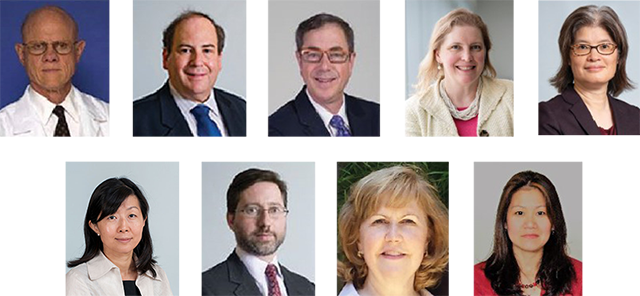News6 Minute ReadApr | 15 | 2023
The MGH Echo Section: A leader in innovation


Innovative. Team-oriented. High-quality.
It is these three terms that perhaps best describe the MGH Echocardiography Section – a team that is continually adapting to new technologies, and training and supporting both new and longtime employees, all while putting patient care at the center of their work.
“Throughout the years I’ve seen great transformation in terms of the lab’s size, technology and research,” says Lanqi Hua, lab technical director and cardiac sonographer. “But all along, the Echo Lab has always focused on quality. It is not infrequent to hear patients say we did a great job, and we’re very proud of this.”
Innovative
Since the lab’s founding in 1980 by Arthur Weyman, MD, one of the pioneers of echocardiography and chief emeritus of MGH Cardiology, it has been at the forefront of the field. The lab was the first to become fully digitized, led the adoption from 2D to 3D technology, and played a pivotal role in establishing comprehensive echo exam protocols now used in many other labs throughout the country.
“We’ve transformed from a VHS and logbook-filled room to a modern, highly-digitized lab with a library archived on servers, accessible anywhere,” says Jonathan Passeri, MD, lab clinical director. “As technology has evolved, we have evolved with it.”
MGH echo protocols are continually modified to ensure the lab meets new standards and adopts rapidly changing technologies. Continued advancements in echocardiography have improved accessibility, reporting capabilities and increased research activities and clinical trials.
Some of the impactful research published by the lab include the development of echo criteria for diagnosis of mitral valve prolapse, the development of segmental wall motion plots for assessment of left ventricular function and determination overall function, development of the valvular score in mitral stenosis by 2D echo for determining suitability for valvuloplasty and unveiling mechanisms of obstructive hypertrophic cardiomyopathy.
As for the next exciting technological advances, Passeri is excited for fusion imaging. “It’s a future avenue that we’ve already been actively engaged in.”
Team-oriented

The lab has experienced significant growth in its four decades, expanding from a few cardiologists to a staff of nearly 40, and offering services at multiple locations across Massachusetts – including on
Nantucket and Martha’s Vineyard – to better meet the needs of its communities.
“One of the remarkable things is the ability of the lab to grow and still maintain a dedication to being a high-quality lab,” Passeri says.
The current staff features a team of leaders, sonographers, physicians, nurses, fellows, trainees and administrative staff working side-by-side to not only provide high-quality patient care, but also to support one another and continue the commitment to training that has existed since the early days of the lab.
This commitment to high-quality training is credited to Jane Marshall, cardiac sonographer and technical director emerita of the Echo Lab. Marshall ensured all sonographers’ hands-on training was comprehensive, pairing a senior sonographer with a junior sonographer for 6 to 8 months before letting the junior sonographer perform an echo independently.
“The cardiac sonographer profession requires hands-on skills and adequate medical knowledge to obtain the necessary images for each case,” says Hua. “Since Marshall and Weyman’s time, sonographers and readers interpret the echo. This teaching style has made the lab excellent, and our past and current leadership have been continuously supporting this type of training.”
In addition to extensive training for sonographers, many of the first echo fellowships occurred at Mass General, and many former lab members have gone on to go run labs elsewhere in the country.
“Many echo leaders in this field were trained in our lab, and now they are leading their echo lab following MGH standards,” Passeri says. “This lab legacy extends worldwide with MGHers at their helm.”
But the lab does not thrive solely on the work on sonographers and clinical staff. “This place wouldn’t run without our administrative staff,” says Passeri, “unseen by patients but crucial and critical to making the whole place run.”
High-quality
In 1998, Mass General’s Echo Lab was the first in the Northeast to receive accreditation from the Intersocietal Accreditation Commission (IAC) in all categories: adult and pediatric transthoracic, adult and pediatric transesophageal and adult stress. Recently, the lab again earned a three-year term of IAC accreditation in echocardiography, marking 25 years of continuous IAC accreditation for the lab, one of few echo labs in the world to achieve this honor.
“Quality has always been at the top of our priorities,” says Passeri. “We have always endeavored to maintain the highest level of quality while also maintaining the daily ins and outs of running the lab. This accreditation is a particularly meaningful milestone because of all that.”
The initial charge for accreditation was led by then-medical director of Echocardiography Michael Picard, MD, whose leadership and insistence on high standards set the wheels in motion to achieve this accreditation. The tradition of excellence has continued since under the current medical direction of Judy Hung, MD.
“I’ve been one piece in the great legacy that is this lab and it’s such an honor,” says Passeri. “It is such a special place. Patients come here because of the reputation of MGH providing the highest quality of care, and that is certainly no different in the Echo Lab.”
